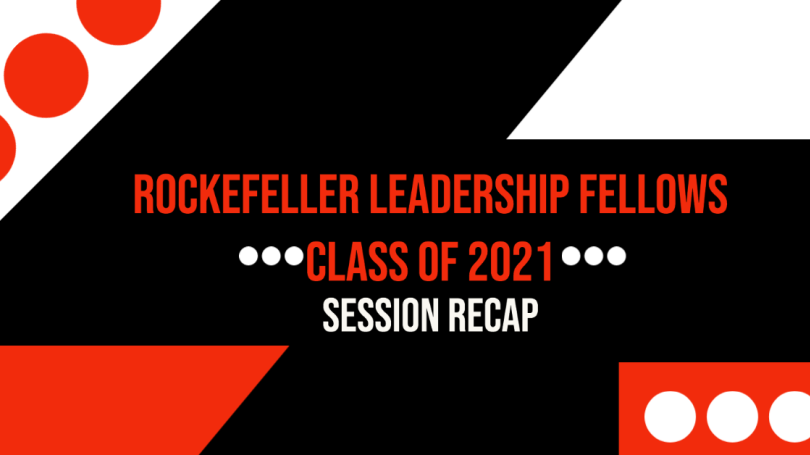
- Public Policy
- Leadership
- Funding
- News & Events
- About the Center
Back to Top Nav
Back to Top Nav
Back to Top Nav
Back to Top Nav
The Winter Retreat was held on Friday evening, reuniting the Synchronous and Asynchronous cohorts together for the first time since the Fall Retreat. A Dartmouth Class of 2010 alumna was the speaker for the event, Ms. Jessica Guthrie. The Senior Managing Director of Teacher Leadership Development at Teach For America Dallas-Fort Worth, Ms. Guthrie has vast experience aiding the leadership development of young adults. As a former TFA teacher in Dallas herself, Ms. Guthrie also has experience working as a young professional with a multi-generational team. These are the experiences from which Ms. Guthrie drew to inform her presentation, as well as her Master of Educational Leadership & Policy.
Ms. Guthrie began the session asking the Fellows how they want to be perceived by their supervisor and colleagues by the end of their first year of their first job. The reason for asking the Fellows to reflect was that Ms. Guthrie believes it is important to know who you want to be and how you want to be perceived. Once this question is answered, you can begin to answer another question: how do I lead in an intergenerational work environment? To achieve this goal while staying true to oneself and respecting the myriad experiences, perspectives, and identities of your colleagues requires the deft application of leadership skills. To elaborate on this point, Ms. Guthrie recalled her first year with TFA, sharing her trials and tribulations and asking the Fellows to make note of moments of opportunity to lead in her intergenerational work environment that she missed. After the Fellows made a number of suggestions as to how Ms. Guthrie could have better adapted to her differences with older colleagues and developed healthier relationships with those colleagues, Ms. Guthrie emphasized to the Fellows that they clearly already possess the necessary leadership skills to become deft navigators of intergenerational professional relationships. All that is needed is a mindset shift, a strategy for which Ms. Guthrie introduced.
Adapted from The Outward Mindset, a self-help book by The Arbinger Institute, Ms. Guthrie advocated for a conscious shift from an inward mindset to an outward mindset. In an inward mindset, an individual is removed from others, focused solely on their objectives and viewing others as objects. In contrast, a person utilizing an outward mindset pursues their objectives while taking others into account, perceiving the needs, objectives, and challenges of others. It takes deliberate, mindful action to switch one’s mindset from inward to outward. To end the session, Ms. Guthrie offered several pieces of advice for the Fellows: be a learner, be humble, cultivate relationships, always build trust, and prioritize thoughtful communication.
The content shared by Ms. Guthrie had a number of connections to past sessions. At one point, Ms. Guthrie reminded the Fellows that it is not only people with titles in the workplace that can offer advice or mentorship. Often, you can learn just as much, if not more, from colleagues that possess informal authority, a topic from a prior session. In addition, intergenerational relationship building requires many of the same leadership skills and strategies introduced by Professor Shaiko in his discussion of bridging and bonding. Many of these skills and competencies simultaneously build on one another and require the application of others, preparing the Fellows to be intergenerational leaders in their future workplaces and communities.
-Written by Maria Smith-Lopez, Class of 2021 Rockefeller Leadership Fellow and Student Program Assistant
As Rockefeller Leadership Fellows, seniors gain a better understanding of the qualities and responsibilities expected of leaders. As Fellows take part in the workshops, discussions, and team-building exercises, they examine their skills, qualities, and attributes as leaders and analyze how these influence teamwork and achieving goals.